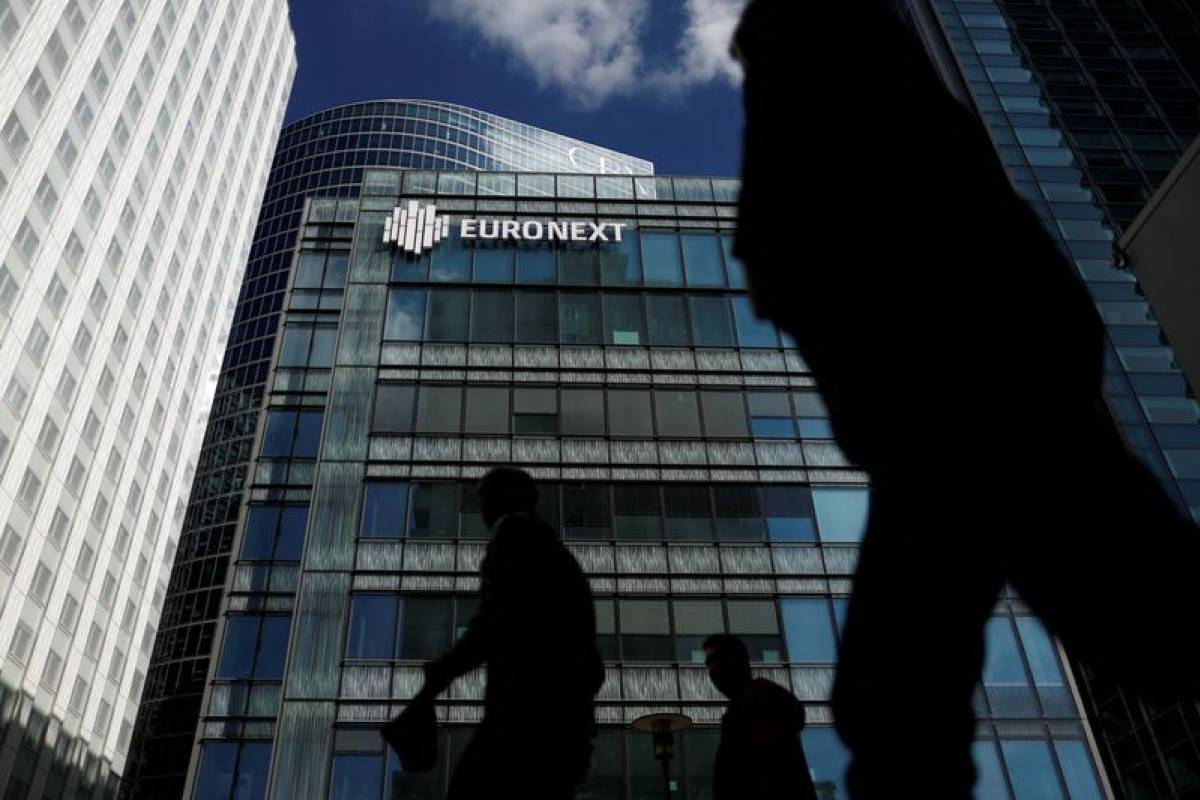The Euronext stock exchange in the La Défense business district in Paris
by CORENTIN CHAPRON
PARIS (Reuters) – The main European stock markets are expected to be on a bearish note at the opening on Monday, in a context of geopolitical concerns, after the Hamas attack on Israel, and economic concerns after the publication of the American employment report and before the opening of the results season in the United States.-0.36
Futures contracts suggest an opening down 0.18% for the Parisian CAC 40, stable for the FTSE in London, and down 0.36% for the Dax in Frankfurt, and 0.24% for the EuroStoxx 50.
The Palestinian Islamist group Hamas launched a surprise assault on Saturday from the Gaza Strip against Israel, which experienced its deadliest day since the Yom Kippur War 50 years ago, and immediately responded with bombings on the Gaza Strip.
The sudden increase in tension in the Middle East worries the markets, which fear an extension of the conflict: retaliation by Israel against Iran, which it accuses of supporting Hamas, could have repercussions on the oil markets, while a longer conflict has the potential to destabilize a weakened region.
The rapprochement between Israel and Saudi Arabia negotiated by the United States is also now weakened even though Riyadh had committed to increasing its oil production as part of the agreement.
Investors also have to deal with a rocky American economy, with employment figures in the United States having been much better than expected.
The increase in sovereign bond yields in the United States, which last week reached a record since 2007, removes for the markets the risks of a new rate hike by the Federal Reserve but the inflation figures expected this week could encourage the central bank to tighten rates further, if they are also on the rise.
The opening of the results season in the United States at the end of the week and the publication of the minutes of the last Fed meeting also encourage caution as investors look for catalysts for risky assets.
VALUES TO FOLLOW:
OIL
Geopolitical uncertainty in the Middle East is causing crude oil prices to jump, with Iranian or Saudi production potentially being affected by an extension of the conflict.
Brent rose 3.29% to $87.36 per barrel, with American light crude (West Texas Intermediate, WTI) gaining 3.59% to $85.76.
CHANGES
The dollar is taking advantage of its role as a safe haven asset and strengthening in a context of uncertainty, while the September employment report provided further proof of the resilience of the American economy.
The dollar advanced 0.23% against a basket of reference currencies, while the euro lost 0.34% to $1.055 and the pound sterling 0.22% to $1.2211.
In Asia, the yen strengthened by 0.14% to 149.11 yen per dollar, while the Australian dollar fell by 0.36% to 0.636 dollars.
RATE
Geopolitical uncertainty benefits sovereigns, the ultimate safe asset, but yields remain supported by rate concerns after Friday’s jobs report.
The German ten-year yield fell 5.4 bp to 2.837%, while that of the two-year rate dropped 3.3 bp to 3.093%.
IN ASIA
Japanese markets are closed for Sports and Health Day, a public holiday.
Chinese indices are falling for their reopening after eight days of closing, on the occasion of the “golden week”, the spending of Chinese consumers during this week having in fact been less significant than expected by the government. The Shanghai SSE Composite lost 0.68%, and the CSI 300 lost 0.63%.
A WALL STREET
The New York Stock Exchange ended higher on Friday, driven by technology stocks, as investors assessed the monthly employment report in the United States.
The Dow Jones index gained 0.87%, or 288.01 points, to 33,407.58 points. The broader S&P-500 gained 50.31 points, 1.18%, to 4,308.50 points. The Nasdaq Composite advanced 211.51 points (1.60%) to 13,431.34 points.
(edited by Blandine Hénault and Bertrand Boucey)
